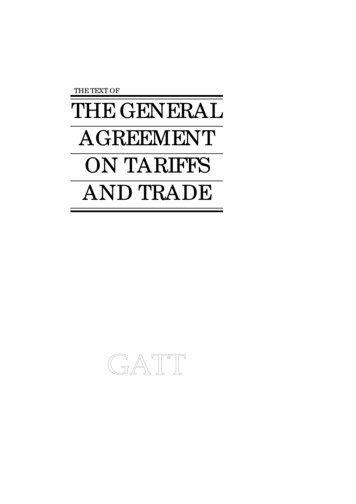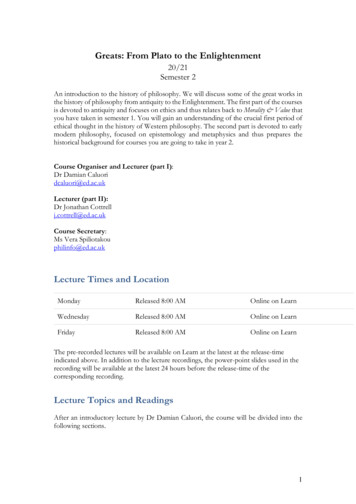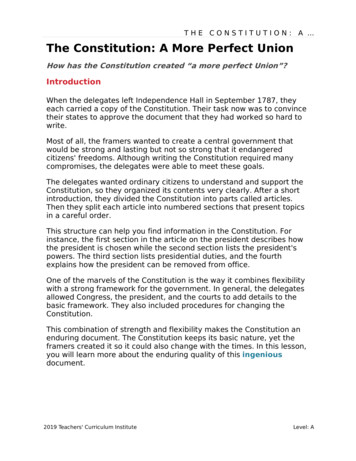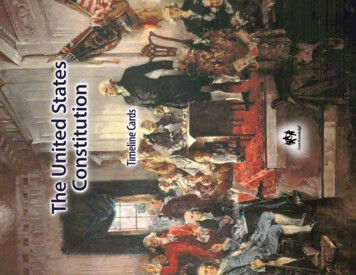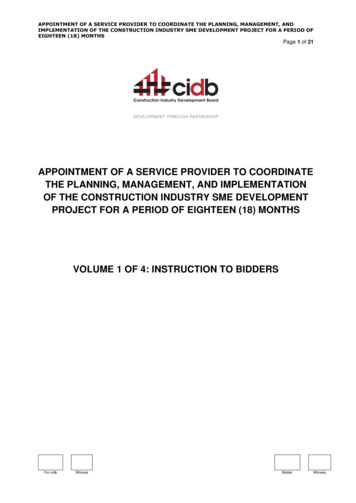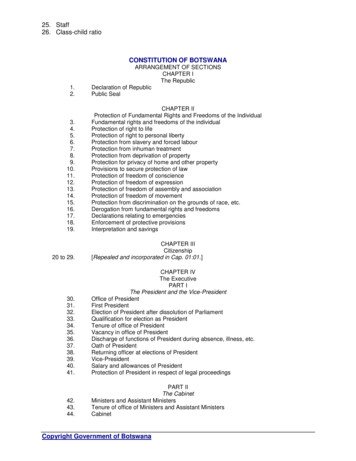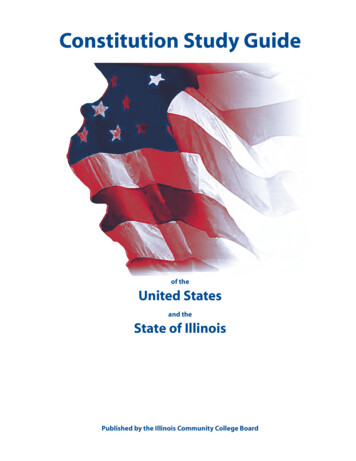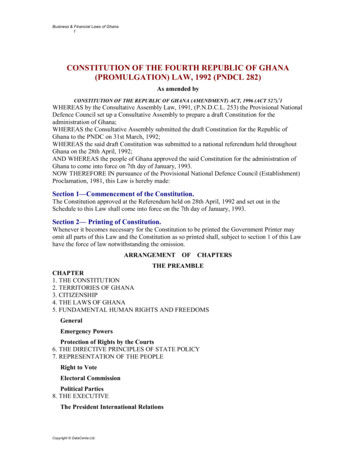
Transcription
Business & Financial Laws of Ghana1CONSTITUTION OF THE FOURTH REPUBLIC OF GHANA(PROMULGATION) LAW, 1992 (PNDCL 282)As amended byCONSTITUTION OF THE REPUBLIC OF GHANA (AMENDMENT) ACT, 1996 (ACT 527).i1WHEREAS by the Consultative Assembly Law, 1991, (P.N.D.C.L. 253) the Provisional NationalDefence Council set up a Consultative Assembly to prepare a draft Constitution for theadministration of Ghana;WHEREAS the Consultative Assembly submitted the draft Constitution for the Republic ofGhana to the PNDC on 31st March, 1992;WHEREAS the said draft Constitution was submitted to a national referendum held throughoutGhana on the 28th April, 1992;AND WHEREAS the people of Ghana approved the said Constitution for the administration ofGhana to come into force on 7th day of January, 1993.NOW THEREFORE IN pursuance of the Provisional National Defence Council (Establishment)Proclamation, 1981, this Law is hereby made:Section 1—Commencement of the Constitution.The Constitution approved at the Referendum held on 28th April, 1992 and set out in theSchedule to this Law shall come into force on the 7th day of January, 1993.Section 2— Printing of Constitution.Whenever it becomes necessary for the Constitution to be printed the Government Printer mayomit all parts of this Law and the Constitution as so printed shall, subject to section 1 of this Lawhave the force of law notwithstanding the omission.ARRANGEMENT OF CHAPTERSTHE PREAMBLECHAPTER1. THE CONSTITUTION2. TERRITORIES OF GHANA3. CITIZENSHIP4. THE LAWS OF GHANA5. FUNDAMENTAL HUMAN RIGHTS AND FREEDOMSGeneralEmergency PowersProtection of Rights by the Courts6. THE DIRECTIVE PRINCIPLES OF STATE POLICY7. REPRESENTATION OF THE PEOPLERight to VoteElectoral CommissionPolitical Parties8. THE EXECUTIVEThe President International RelationsCopyright DataCenta Ltd.
Business & Financial Laws of Ghana2The CabinetThe National Security CouncilNational Development Planning CommissionThe Attorney-General9. THE COUNCIL OF STATE10. THE LEGISLATUREComposition of ParliamentProcedure in ParliamentSummoning, Dissolution, etc.Privileges and ImmunitiesContempt of ParliamentThe Parliamentary Service11. THE JUDICIARYGeneralThe Supreme CourtThe Court of AppealThe High CourtRegional TribunalsAppointment, retirement and removal of Justices of Superior Courts and Chairmen andother members of Regional Tribunals.Appointment, retirement and removal of Judicial OfficersThe Judicial CouncilMiscellaneous12. FREEDOM AND INDEPENDENCE OF THE MEDIA13. FINANCEGeneralStatistical ServiceThe Auditor-GeneralThe Audit Service14. THE PUBLIC SERVICES15. THE POLICE SERVICE16. THE PRISONS SERVICE17. THE ARMED FORCES OF GHANA18. COMMISSION ON HUMAN RIGHTS AND ADMINISTRATIVE JUSTICE19. NATIONAL COMMISSION FOR CIVIC EDUCATION20. DECENTRALIZATION AND LOCAL GOVERNMENT21. LANDS AND NATURAL RESOURCESPublic LandsLands CommissionCopyright DataCenta Ltd.
Business & Financial Laws of Ghana3Ownership of land by Non-CitizensStool and Skin Lands and PropertyProtecting Natural Resources22. CHIEFTAINCY23. COMMISSIONS OF INQUIRY24. CODE OF CONDUCT FOR PUBLIC OFFICERS25. AMENDMENT OF THE CONSTITUTION26. MISCELLANEOUSSCHEDULESFirst SchedulePart IPart IIPart IIIPart IVSecond ScheduleTransitional ProvisionsFirst PresidentFirst ParliamentThe JudiciaryMiscellaneousOathsTHE CONSTITUTION OF THE REPUBLIC OF GHANAARRANGEMENT OF ARTICLESCHAPTER ONE—THE CONSTITUTIONArticle1. Supremacy of the Constitution2. Enforcement of the Constitution3. Defence of the ConstitutionCHAPTER TWO—TERRITORIES OFGHANA4. Territories of Ghana5. Creation, Alteration or Merger of RegionsCHAPTER THREE—CITIZENSHIP6. Citizenship of Ghana7. Persons entitled to be registered as Citizens8. Dual Citizenship9. Citizenship Laws by Parliament10. InterpretationCHAPTER FOUR—THE LAWS OFGHANA11. The Laws of GhanaCHAPTER FIVE—FUNDAMENTAL HUMAN RIGHTS AND FREEDOMSGeneral12. Protection of Fundamental Human Rights and Freedoms13. Protection of Right to Life14. Protection of Personal LibertyCopyright DataCenta Ltd.
Business & Financial Laws of Ghana415. Respect for Human Dignity16. Protection from Slavery and Forced Labour17. Equality and Freedom from Discrimination18. Protection of Privacy of Home and Other Property19. Fair Trial20. Protection from Deprivation of Property21. General Fundamental Freedoms22. Property Rights of Spouses23. Administrative Justice24. Economic Rights25. Educational Rights26. Cultural Rights and Practices27. Women's Rights28. Children's Rights29. Rights of Disabled Persons30. Rights of the SickEmergency Powers31. Emergency Powers32. Persons detained under Emergency LawsProtection of Rights by the Courts33. Protection of Rights by the CourtsCHAPTER SIX—THE DIRECTIVE PRINCIPLES OF STATE POLICY34. Implementation of Directive Principles35. Political Objectives36. Economic Objectives37. Social Objectives38. Educational Objectives39. Cultural Objectives40. International Relations41. Duties of a CitizenCHAPTER SEVEN—REPRESENTATION OF THE PEOPLERight to Vote42. Right to Vote43. Electoral Commission44. Qualifications, Terms and Conditions of Service of Members of Electoral CommissionCopyright DataCenta Ltd.
Business & Financial Laws of Ghana545. Functions of Electoral Commission46. Independence of the Commission47. Constituencies48. Appeals from Decisions of Commission49. Voting at Elections and Referenda50. Election of Candidates51. Regulations for Elections and Referenda52. Regional and District Representatives of Commission53. Appointment of Staff of Commission54. Expenses of Commission charged on Consolidated FundPolitical Parties55. Organization of Political Parties56. Restriction of Certain PropagandaCHAPTER EIGHT—THE EXECUTIVEThe President57. The President of Ghana58. Executive Authority of Ghana59. Absence from Ghana60. The Vice-President and Succession to the Presidency61. Public and Presidential Seals62. Qualifications of President63. Election of President64. Challenging Election of President65. Presidential Election Regulations66. Term of Office of President67. Presidential Messages68. Conditions of Office of President69. Removal of President70. Appointments by President71. Determination of Certain Emoluments72. Prerogative of MercyInternational Relations73. International Relations74. Diplomatic Representation75. Execution of TreatiesCopyright DataCenta Ltd.
Business & Financial Laws of Ghana6The Cabinet76. The Cabinet77. Meetings of the Cabinet78. Ministers of State79. Deputy Ministers80. Oaths81. Tenure of Office of Ministers, etc.82. Vote of CensureThe National Security Council83. The National Security Council84. Functions of the National Security Council85. Establishment of Security ServicesNational Development Planning Commission86. National Development Planning Commission87. Functions of National Development Planning CommissionThe Attorney-General88. The Attorney-GeneralCHAPTER NINE—THE COUNCIL OF STATE89. The Council of State90. Consideration of Bills by the Council of State91. Other functions of the Council92. Meetings of Council of StateCHAPTER TEN—THE LEGISLATUREComposition of Parliament93. The Parliament of Ghana94. Qualifications and Eligibility95. The Speaker96. Deputy Speakers97. Tenure of Office of Members98. Emoluments of Members99. Determination of MembershipProcedure in Parliament100. Oath of Members101. Presiding in Parliament102. Quorum in ParliamentCopyright DataCenta Ltd.
Business & Financial Laws of Ghana7103. Committees of Parliament104. Voting in Parliament105. Unqualified Person Sitting or Voting106. Mode of Exercising Legislative Power107. Retroactive Legislation108. Settlement of Financial Matters109. Professional Organisations110. Standing Orders of Parliament111. Attendance in Parliament of Vice-President and MinistersSummoning, Dissolution, etc.112. Sessions of Parliament113. Dissolution of Parliament114. Gratuities for Members of ParliamentPrivileges and Immunities115. Freedom of Speech and of Proceedings116. Immunity from Proceedings for Acts in Parliament117. Immunity from Service of Process and Arrest118. Immunity from Witness Summons119. Immunity from Service as Juror120. Immunity for Publication of Proceedings121. Privileges of WitnessesContempt of Parliament122. General Contempt123. Criminal ProceedingsThe Parliamentary Service124. The Parliamentary ServiceCHAPTER ELEVEN—THE JUDICIARYGeneral125. The Judicial Power of Ghana126. Composition and Mode of Exercise of Power of Judiciary127. Independence of the JudiciaryThe Supreme Court128. Composition of Supreme Court and Qualifications of its Justices129. General Jurisdiction of Supreme Court130. Original Jurisdiction of Supreme CourtCopyright DataCenta Ltd.
Business & Financial Laws of Ghana8131. Appellate Jurisdiction of Supreme Court132. Supervisory Jurisdiction of Supreme Court133. Power of Supreme Court to Review its decisions134. Powers of a Single Justice of Supreme Court135. Production of Official Documents in CourtThe Court of Appeal136. Composition of Court of Appeal and Qualifications of its Justices137. Jurisdiction of Court of Appeal138. Powers of a Single Justice of Court of AppealThe High Court139. Composition of High Court and Qualifications of its Justices140. Jurisdiction of the High Court141. Supervisory Jurisdiction of the High CourtRegional Tribunals142. Establishment and Composition of Regional Tribunals and Qualifications of Chairmen andother Panel Members143. Jurisdiction of Regional TribunalsAppointment, Retirement and Removal of Justices of Superior Courts and Chairmen andother Members of Regional Tribunals144. Appointment of Justices of Superior Courts and Chairmen and other Members of RegionalTribunals145. Retirement and Resignation of Justices of the Superior Courts and Chairmen of RegionalTribunals146. Removal of Justices of Superior Courts and Chairmen of Regional Tribunals147. Service Conditions and Removal of Panel Members of Regional Tribunal other than theChairmanAppointment, Retirement and Removal of Judicial Officers148. Appointment of Judicial Officers149. Conditions of Service of Judicial Officers150. Retirement and Resignation of Judicial Officers151. Removal of Judicial Officers152. Appointment, Allowances and Removal of Lower Court or Tribunal Panel membersThe Judicial Council153. Judicial Council154. Functions of Judicial CouncilMiscellaneous155. Retiring Awards of Superior Court JusticesCopyright DataCenta Ltd.
Business & Financial Laws of Ghana9156. Judicial Oath157. Rules of Court158. Other Officers and Employees of Courts159. Regulations by Chief Justice160. Fees of the Courts to form part of Consolidated Fund161. InterpretationCHAPTER TWELVE—FREEDOM AND INDEPENDENCE OF THE MEDIA162. Freedom and Responsibility of the Media163. Responsibility of State-owned Media164. Limitation on Rights and Freedoms165. Media Rights and Freedoms to be Additional to Fundamental Human Rights166. National Media Commission167. Functions of the Commission168. Appointment of Board Members of State-owned Media169. Appointment of Editors170. Staff of Commission171. Expenses of Commission charged on Consolidated Fund172. Independence of Commission173. Independence of JournalistsCHAPTER THIRTEEN—FINANCEGeneral174. Taxation175. Public Funds of Ghana176. The Consolidated Fund177. Contingency Fund178. Withdrawal from Public Funds, etc.179. Authorisation of Expenditure180. Expenditure in Advance of Appropriation181. Loans182. Public Debt183. The Central Bank184. Foreign Exchange DealingsStatisticalService185. Statistical Service186. Statistical Service BoardCopyright DataCenta Ltd.
Business & Financial Laws of Ghana10The Auditor-General187. The Auditor-GeneralThe Audit Service188. The Audit Service189. The Audit Service BoardCHAPTER FOURTEEN—THE PUBLIC SERVICES190. The Public Services of Ghana191. Protection of Public Officers192. Establishment of Public Corporations193. Head of Civil Service194. The Public Services Commission195. Appointments, etc. of Public Officers196. Other Functions of the Public Services Commission197. Regulations198. Independence of Commission199. Retiring Age and PensionCHAPTER FIFTEEN—THE POLICE SERVICE200. The Police Service201. The Police Council202. The Inspector-General of Police and Appointment of Members of Police Service203. Functions of the Police Council204. Regional Police CommitteesCHAPTER SIXTEEN—THE PRISONS SERVICE205. The Prisons Service206. The Prisons Service Council207. Director-General of Prisons Service and Appointment of Members of Service208. Functions of Prisons Service Council209. Regional Prisons CommitteesCHAPTER SEVENTEEN—THE ARMED FORCES OF GHANA210. Armed Forces of Ghana211. Armed Forces Council212. Appointments213. The Chief of Defence Staff214. Functions of Armed Forces Council215. Delegation of FunctionsCopyright DataCenta Ltd.
Business & Financial Laws of Ghana11CHAPTER EIGHTEEN—COMMISSION ON HUMAN RIGHTS ANDADMINISTRATIVE JUSTICE216. Commission on Human Rights and Administrative Justice217. Appointment of Members of Commission218. Functions of Commission219. Special Powers of Investigation220. Regional and District Branches of Commission221. Qualifications of Commissioners222. Commissioners not to hold other Public Office223. Terms and Conditions of Service of Commissioners224. Acting Appointments225. Independence of Commission and Commissioners226. Appointment of Staff227. Expenses of Commission charged on Consolidated Fund228. Removal of Commissioners229. Initiation of Legal Proceedings230. RegulationsCHAPTER NINETEEN—NATIONAL COMMISSION FOR CIVIC EDUCATION231. Establishment of National Commission for Civic Education232. Membership of Commission233. Functions of Commission234. Independence of Commission235. Terms and Conditions of Service of Members of Commission236. Removal of Chairman and Deputy Chairmen237. Regional and District Branches of Commission238. Appointment of Staff239. Expenses of Commission charged on Consolidated FundCHAPTER TWENTY—DECENTRALIZATION AND LOCAL GOVERNMENT240. Local Government241. Districts of Local Government242. Composition of District Assembly243. District Chief Executive244. Presiding Member245. Functions of District Assemblies246. Terms of District AssemblyCopyright DataCenta Ltd.
Business & Financial Laws of Ghana12247. Qualifications and Procedures248. Political Parties and Candidates for Election to Local Government Units249. Revocation of Mandate by Electorate250. Emoluments of District Chief Executive and Presiding Member251. Executive Committee252. District Assemblies Common Fund and Grants-in-Aid253. Audit254. Further Decentralization255. Regional Co-ordinating Councils256. Regional Ministers and Deputy Regional MinistersCHAPTER TWENTY-ONE—LANDS AND NATURAL RESOURCESPublic Lands257. Public Lands and other Public Property258. Lands Commission259. Membership of Commission260. Regional Lands Commission261. Membership of Regional Lands Commission262. Regional Lands Officer263. Qualifications of Members264. Tenure of Office of Members of Commission265. Independence of Lands CommissionOwnership of Land by Non-Citizens266. Ownership of Land by Non-CitizensStool and Skin Lands and Property267. Stool and Skin Lands and PropertyProtecting Natural Resources268. Parliamentary Ratification of Agreements Relating to Natural Resources269. Natural Resources CommissionsCHAPTER TWENTY-TWO—CHIEFTAINCY270. Institution of Chieftaincy271. National House of Chiefs272. Functions of the National House of Chiefs273. Jurisdiction of the National House of Chiefs274. Regional House of Chiefs275. Disqualification of Convicted PersonsCopyright DataCenta Ltd.
Business & Financial Laws of Ghana13276. Chiefs not to take part in Active Party Politics277. Definition of ChiefCHAPTER TWENTY-THREE—COMMISSIONS OF INQUIRY278. Appointment of Commission of Inquiry279. Powers of Commission of Inquiry280. Functions of Commission of Inquiry281. Inquiry Procedure282. Assistance by Lawyer or Other Expert283. Immunities and Privileges of WitnessesCHAPTER TWENTY-FOUR—CODE OF CONDUCT FOR PUBLIC OFFICERS284. Conflict of Interest285. Other Public Appointments286. Declaration of Assets and Liabilities287. Complaints of Contravention288. InterpretationCHAPTER TWENTY-FIVE—AMENDMENT OF THE CONSTITUTION289. Amendment of Constitution290. Amendment of Entrenched Provisions291. Amendment of Non-Entrenched Provisions292. Certificate of Compliance with ConstitutionCHAPTER TWENTY-SIX—MISCELLANEOUS293. Claims against Government294. Legal Aid295. Interpretation296. Exercise of Discretionary Power297. Implied Power, etc.298. Residual Powers of Parliament299. Transitional ProvisionsTHE CONSTITUTION OF THE REPUBLIC OF GHANAIN THE NAME OF THE ALMIGHTY GODWe the People of Ghana,IN EXERCISE of our natural and inalienable right to establish a framework of government whichshall secure for ourselves and posterity the blessings of liberty, equality of opportunity andprosperity;IN A SPIRIT of friendship and peace with all peoples of the world;AND IN SOLEMN declaration and affirmation of our commitment to;Freedom, Justice, Probity and Accountability;The Principle that all powers of Government spring from the Sovereign Will of the People;Copyright DataCenta Ltd.
Business & Financial Laws of Ghana14The Principle of Universal Adult Suffrage;The Rule of Law;The protection and preservation of Fundamental Human Rights and Freedoms, Unity andStability for our Nation;DO HEREBY ADOPT, ENACT AND GIVE TO OURSELVES THIS CONSTITUTION.CHAPTER ONE—THE CONSTITUTIONArticle 1—Supremacy of the Constitution.(1) The Sovereignty of Ghana resides in the people of Ghana in whose name and for whosewelfare the powers of government are to be exercised in the manner and within the limits laiddown in this Constitution.(2) This Constitution shall be the supreme law of Ghana and any other law found to beinconsistent with any provision of this Constitution shall, to the extent of the inconsistency,be void.Article 2—Enforcement of the Constitution.(1) A person who alleges that—(a) an enactment or anything contained in or done under the authority of that or any otherenactment; or(b) any act or omission of any person,is inconsistent with, or is in contravention of a provision of this Constitution, may bring an actionin the Supreme Court for a declaration to that effect.(2) The Supreme Court shall, for the purposes of a declaration under clause (1) of this article,make such orders and give such directions as it may consider appropriate for giving effect, orenabling effect to be given, to the declaration so made.(3) Any person or group of persons to whom an order or direction is addressed under clause (2) ofthis article by the Supreme Court, shall duly obey and carry out the terms of the order ordirection.(4) Failure to obey or carry out the terms of an order or direction made or given under clause (2)of this article constitutes a high crime under this Constitution and shall, in the case of thePresident or the Vice-President, constitute a ground for removal from office under thisConstitution.(5) A person convicted of a high crime under clause (4) of this article shall—(a) be liable to imprisonment not exceeding ten years without the option of a fine; and(b) not be eligible for election, or for appointment, to any public office for ten years beginningwith the date of the expiration of the term of imprisonment.Article 3— Defence of the Constitution.(1) Parliament shall have no power to enact a law establishing a one-party state.(2) Any activity of a person or group of persons which suppresses or seeks to suppress the lawfulpolitical activity of any other person or any class of persons, or persons generally is unlawful.(3) Any person who—Copyright DataCenta Ltd.
Business & Financial Laws of Ghana15(a) by himself or in concert with others by any violent or other unlawful means, suspends oroverthrows or abrogates this Constitution or any part of it, or attempts to do any such act; or(b) aids and abets in any manner any person referred to in paragraph (a) of this clause,commits the offence of high treason and shall, upon conviction, be sentenced to suffer death.(4) All citizens of Ghana shall have the right and duty at all times—(a) to defend this Constitution, and in particular, to resist any person or group of persons seekingto commit any of the acts referred to in clause (3) of this article; and(b) to do all in their power to restore this Constitution after it has been suspended, overthrown, orabrogated as referred to in clause (3) of this article.(5) Any person or group of persons who suppresses or resists the suspension, overthrow orabrogation of this Constitution as referred to in clause (3) of this article, commits no offence.(6) Where a person referred to in clause (5) of this article is punished for any act done under thatclause, the punishment shall, on the restoration of this Constitution, be taken to be void fromthe time it was imposed and he shall, from that time, be taken to be absolved from allliabilities arising out of the punishment.(7) The Supreme Court shall, on application by or on behalf of a person who has suffered anypunishment or loss to which clause (6) of this article relates, award him adequatecompensation, which shall be charged on the Consolidated Fund, in respect of any sufferingor loss incurred as a result of the punishment.CHAPTER TWO—TERRITORIES OF GHANAArticle 4—Territories of Ghana.(1) The sovereign State of Ghana is a unitary republic consisting of those territories comprised inthe regions which, immediately before the coming into force of this Constitution, existed inGhana, including the territorial sea and the air space.(2) Parliament may by law provide for the delimitation of the territorial sea, the contiguous zone,the exclusive economic zone and the continental shelf of Ghana.Article 5—Creation, Alteration or Merger of Regions.(1) Subject to the provisions of this article, the President may, by constitutional instrument—(a) create a new region;(b) alter the boundaries of a region; or(c) provide for the merger of two or more regions.(2) If the President, upon a petition being presented to him and, on the advice of the Council ofState, is satisfied that there is a substantial demand for—(a) the creation of a new region;(b) the alteration of the boundaries of a region, whether or not the alteration involves the creationof a new region; or(c) the merger of any two or more regions;he shall, acting in accordance with the advice of the Council of State, appoint a commission ofinquiry to inquire into the demand and to make recommendations on all the factors involved inthe creation, alteration or merger.Copyright DataCenta Ltd.
Business & Financial Laws of Ghana16(3) If, notwithstanding that a petition has not been presented to him, the President is, on theadvice of the Council of State, satisfied that the need has arisen for taking any of the stepsreferred to in paragraphs (a), (b) and (c) of clause (1) of this article, he may, acting inaccordance with the advice of the Council of State, appoint a commission of inquiry toinquire into the need and to make recommendations on all the factors involved in the creation,alteration or merger.(4) Where a commission of inquiry appointed under clause (2) or (3) of this article finds that thereis the need and a substantial demand for the creation, alteration or merger referred to in eitherof those clauses, it shall recommend to the President that a referendum be held, specifying theissues to be determined by the referendum and the places where the referendum should beheld.(5) The President shall refer the recommendations to the Electoral Commission, and thereferendum shall be held in a manner prescribed by the Electoral Commission.(6) An issue referred for determination by referendum under clauses (4) and (5) shall not be takento be determined by the referendum unless at least fifty per cent of the persons entitled to votecast their votes at the referendum, and of the votes cast at least eighty per cent were cast infavour of that issue.(7) Where a referendum involves the merger of two or more regions, the issue shall not be takento be determined unless at least sixty per cent of the persons entitled to vote at the referendumin each such region voted in favour of the merger of the two or more regions; and accordingly,clause (6) of this article shall not apply to the referendum.(8) The President shall, under clause (1) of this article, and acting in accordance with the resultsof the referendum held under clauses (4) and (5) of this article, issue a constitutionalinstrument giving effect, or enabling effect to be given, to the results.CHAPTER THREE—CITIZENSHIPArticle 6—Citizenship of Ghana.(1) Every person who, on the coming into force of this Constitution, is a citizen of Ghana by lawshall continue to be a citizen of Ghana.(2) Subject to the provisions of this Constitution, a person born in or outside Ghana after thecoming into force of this Constitution, shall become a citizen of Ghana at the date of his birthif either of his parents or grandparents is or was a citizen of Ghana.(3) A child of not more than seven years of age found in Ghana whose parents are not knownshall be presumed to be a citizen of Ghana by birth.(4) A child of not more than sixteen years of age neither of whose parents is a citizen of Ghanawho is adopted by a citizen of Ghana shall, by virtue of the adoption, be a citizen of Ghana.Article 7—Persons Entitled to be Registered as Citizens.(1) A woman married to a man who is a citizen of Ghana or a man married to a woman who is acitizen of Ghana may, upon making an application in the manner prescribed by Parliament,be registered as a citizen of Ghana.(2) Clause (1) of this article applies also to a person who was married to a person who, but for hisor her death, would have continued to be a citizen of Ghana under clause (1) of article 6 ofthis Constitution.Copyright DataCenta Ltd.
Business & Financial Laws of Ghana17(3) Where the marriage of a woman is annulled after she has been registered as a citizen of Ghanaunder clause (1) of this article, she shall, unless she renounces that citizenship, continue to bea citizen of Ghana.(4) Any child of a marriage of a woman registered as a citizen of Ghana under clause (1) of thisarticle to which clause (3) of this article applies, shall continue to be a citizen of Ghana unlesshe renounces that citizenship.(5) Where upon an application by a man for registration under clause (1) of this article, it appearsto the authority responsible for the registration that a marriage has been entered into primarilywith a view to obtaining the registration, the authority may request the applicant to satisfyhim that the marriage was entered into in good faith; and the authority may only effect theregistration upon being so satisfied.(6) In the case of a man seeking registration, clause (1) of this article applies only if the applicantpermanently resides in Ghana.Article 8—Dual Citizenship.(1) A citizen of Ghana may hold the citizenship of any other country in addition to his citizenshipof Ghana.(2) Without prejudice to article 94 (2) (a) of the Constitution, no citizen of Ghana shall qualify tobe appointed as a holder of any office specified in this clause if he holds the citizenship ofany other country in addition to his citizenship of Ghana—(a) Ambassador or High Commissioner;(b) Secretary to the Cabinet;(c) Chief of Defence Staff or any Service Chief;(d) Inspector-General of Police;(e) Commissioner, Customs, Excise and Preventive Service:(f) Director of Immigration Service; and(g) any office specified by an Act of Parliament.(3) Where the law of a country requires a person who marries a citizen of that country torenounce the citizenship of his own country by virtue of that marriage, a citizen of Ghanawho is deprived of his citizenship of Ghana by virtue of that marriage shall, on the dissolutionof that marriage, become a citizen of Ghana.[As substituted by the Constitution of the Republic ofGhana (Amendment) Act, 1996 (Act 527), s.1]Article 9—Citizenship Laws by Parliament.(1) Parliament may make provision for the acquisition of citizenship of Ghana by persons whoare not eligible to become citizens of Ghana under the provisions of this Constitution.(2) Except as otherwise provided in article 7 of this Constitution, a person shall not be registeredas a citizen of Ghana unless at the time of his application for registration he is able to speakand understand an indigenous language of Ghana.(3) The High Court may, on an application made for the purpose by the Attorney-General,deprive a person who is a citizen of Ghana, otherwise than by birth, of that citizenship on theground—(a) that the activities of that person are inimical to the security of the State or prejudicial to publicmorality or the public interest; or(b) that the citizenship was acquired by fraud, misrepresentation or any other improper orirregular practice.Copyright DataCenta Ltd.
Business & Financial Laws of Ghana18(4) There shall be published in the Gazette by the appropriate authority and within three monthsafter the application or the registration, as the case may be, the name, particulars and otherdetails of a person who, under this article applies to be registered as a citizen of Ghana or hasbeen registered as a citizen of Ghana.(5) Parliament may make provision by Act of Parliament for—(a) the renunciation by any person of his citizenship of Ghana;(b) the circumstances in which a person may acquire citizenship of Ghana or cease to be a citizenof Ghana.[As substituted by the Constitution of the Republic of Ghana (Amendment) Act, 1996 (Act 527),s.2]Article 10—Interpretation.(1) A reference in this Chapter to the citizenship of the parent of a person at the time of the birthof that person shall, in relation to a person born after the death of the parent, be construed as areference to the citizenship of the
CONSTITUTION OF THE FOURTH REPUBLIC OF GHANA (PROMULGATION) LAW, 1992 . . Constitution.



